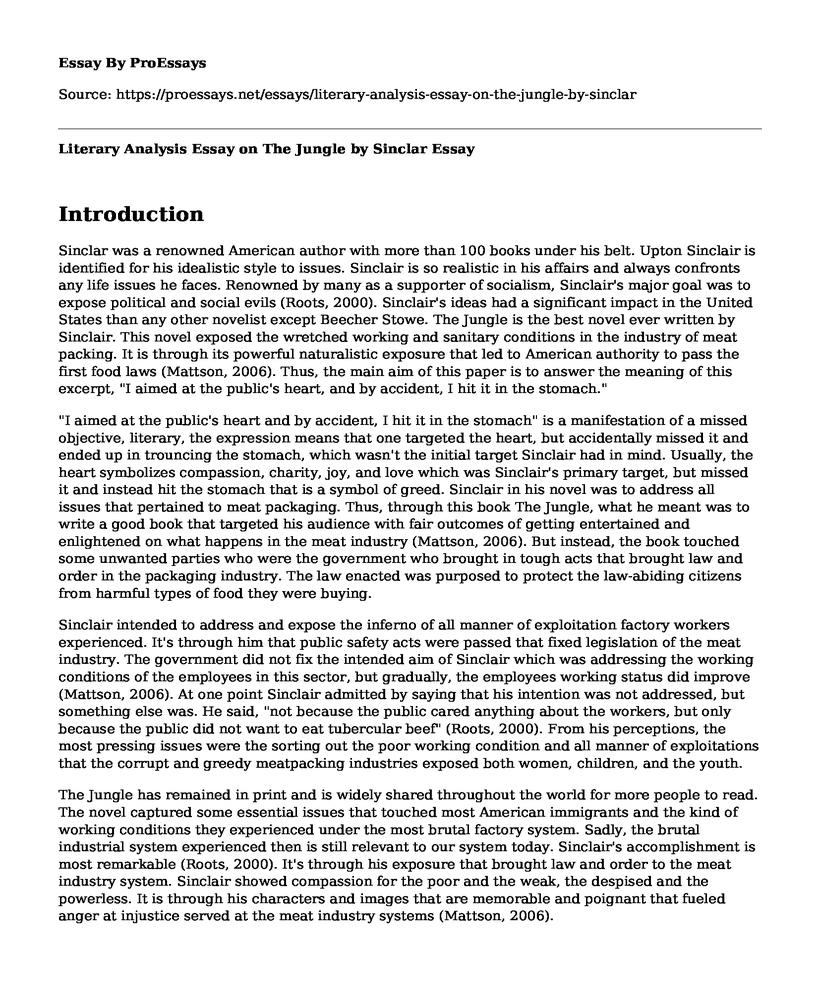Introduction
Sinclar was a renowned American author with more than 100 books under his belt. Upton Sinclair is identified for his idealistic style to issues. Sinclair is so realistic in his affairs and always confronts any life issues he faces. Renowned by many as a supporter of socialism, Sinclair's major goal was to expose political and social evils (Roots, 2000). Sinclair's ideas had a significant impact in the United States than any other novelist except Beecher Stowe. The Jungle is the best novel ever written by Sinclair. This novel exposed the wretched working and sanitary conditions in the industry of meat packing. It is through its powerful naturalistic exposure that led to American authority to pass the first food laws (Mattson, 2006). Thus, the main aim of this paper is to answer the meaning of this excerpt, "I aimed at the public's heart, and by accident, I hit it in the stomach."
"I aimed at the public's heart and by accident, I hit it in the stomach" is a manifestation of a missed objective, literary, the expression means that one targeted the heart, but accidentally missed it and ended up in trouncing the stomach, which wasn't the initial target Sinclair had in mind. Usually, the heart symbolizes compassion, charity, joy, and love which was Sinclair's primary target, but missed it and instead hit the stomach that is a symbol of greed. Sinclair in his novel was to address all issues that pertained to meat packaging. Thus, through this book The Jungle, what he meant was to write a good book that targeted his audience with fair outcomes of getting entertained and enlightened on what happens in the meat industry (Mattson, 2006). But instead, the book touched some unwanted parties who were the government who brought in tough acts that brought law and order in the packaging industry. The law enacted was purposed to protect the law-abiding citizens from harmful types of food they were buying.
Sinclair intended to address and expose the inferno of all manner of exploitation factory workers experienced. It's through him that public safety acts were passed that fixed legislation of the meat industry. The government did not fix the intended aim of Sinclair which was addressing the working conditions of the employees in this sector, but gradually, the employees working status did improve (Mattson, 2006). At one point Sinclair admitted by saying that his intention was not addressed, but something else was. He said, "not because the public cared anything about the workers, but only because the public did not want to eat tubercular beef" (Roots, 2000). From his perceptions, the most pressing issues were the sorting out the poor working condition and all manner of exploitations that the corrupt and greedy meatpacking industries exposed both women, children, and the youth.
The Jungle has remained in print and is widely shared throughout the world for more people to read. The novel captured some essential issues that touched most American immigrants and the kind of working conditions they experienced under the most brutal factory system. Sadly, the brutal industrial system experienced then is still relevant to our system today. Sinclair's accomplishment is most remarkable (Roots, 2000). It's through his exposure that brought law and order to the meat industry system. Sinclair showed compassion for the poor and the weak, the despised and the powerless. It is through his characters and images that are memorable and poignant that fueled anger at injustice served at the meat industry systems (Mattson, 2006).
Sinclair addresses key issues that affect the ordinary folks such as The Jungle. The issues he raises that pertain to employers and employees were well discussed. Sinclair succeeded in addressing the most pressing issues that ever faced the free market. It is through him that first legislation was enacted that up to date safeguard the meat packaging industry and its employees. It is of no secret that the old lies have cropped up in most recent. Its most valuable lessons that Sinclair raised forgotten, and somehow, we are finding ourselves crawling to the jungle again with a feeling seen to be odd of deja vu.
References
ACT, M. I. (1906). Public pressure on Congress to assure the safety of the nation's food supply increased after publication of Upton Sinclair's expose of the meat packing industry, The Jungle (1906), and Charles Edward Russell's muckraking articles on the beef trust. Eager to avoid the bad publicity, the nation's largest meat packing firms endorsed federal regulation and helped fashion the law, which passed Congress as an amendment to an Agriculture Department appropriations bill. The inspections and sanitary measures it ....Mattson, K. (2006).
Upton Sinclair and the other American century. Wiley.Roots, R. (2000). A muckraker's Aftermath: The Jungle of meat-packing regulation after a century. Wm. Mitchell L. Rev., 27, 2413.
Sinclair, U. (2014). The Jungle: (1906). CreateSpace Independent Publishing Platform.
Cite this page
Literary Analysis Essay on The Jungle by Sinclar. (2022, Nov 08). Retrieved from https://proessays.net/essays/literary-analysis-essay-on-the-jungle-by-sinclar
If you are the original author of this essay and no longer wish to have it published on the ProEssays website, please click below to request its removal:
- Rite Of Passage - Poem Amalysis Example
- The Bean Trees Theme Analysis - A Literary Essay
- Poetry Analysis Essay on Elegy
- Research Paper on Fences by August Wilson
- The Relationship Between Achilles and Agamemnon Essay Example
- Essay Example on Exploring Fear & Recognizing Human Limits in 'Dracula' & 'Gaslight' (1944)
- Established Genres: A Reflection of Life Experiences - Essay Example







